
(Matthew 16:13-23)
May these words of this Peter be like a rock,
not a stumbling block!
|
|
"Who do you say
that I am?" Jesus asked. Simon Peter answered, "You
are the Messiah, the Son of the living God." And Jesus
answered, "Blessed are you, Simon son of Jonah! ... You are
Peter (petros), and on this rock (petra)
I will build my church..." Jesus then began to speak of
the rough road ahead. And Peter took him aside and rebuked him... "Get
behind me, Satan!" Jesus replied. "You are a stumbling
block..." (Matthew 16:13-23) May these words of this Peter be like a rock, |
"Only me"
Message preached March 23, 2003
Long Green Valley Church of the Brethren
Glen Arm, Maryland USA
based upon Exodus
20:1-7
I sat in
front of a blank page for the longest time. The funeral of our
brother-in-the-faith, Richard Tracey, was over, and I was trying to come up with
something of worth to say for this morning. A while back I had chosen a
scripture and put 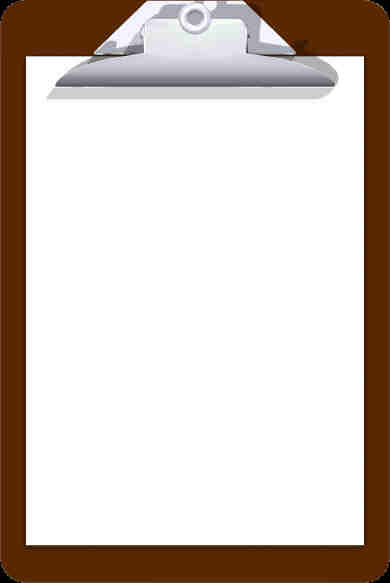 down
a few initial thoughts, along with a title. In this past week Iíd spent some
time mulling over the text in the ways Iíve been taught, sort of like a cook
cutting up meat, potatoes, and vegetables to stew in a pot. I must confess, I
didnít spent as much time and effort in this as I wouldíve liked, but other
things needed to get done. This morningís good news meal was going to be more
like fast food than gourmet. I knew that.
down
a few initial thoughts, along with a title. In this past week Iíd spent some
time mulling over the text in the ways Iíve been taught, sort of like a cook
cutting up meat, potatoes, and vegetables to stew in a pot. I must confess, I
didnít spent as much time and effort in this as I wouldíve liked, but other
things needed to get done. This morningís good news meal was going to be more
like fast food than gourmet. I knew that.
Still I sat, seeking a sense of direction in front of that blasted blank page. Sometimes, sermons just sort of write themselves. Other times itís like pulling teeth. That was the way it was on Friday - the day I usually set aside for this purpose. Dave Sack, by the way, dropped by to talk that afternoon (he was in town for a checkup before flying back to Dhaka yesterday - he sends his greetings). Dave told me that when he has a similar block he yells at himself - "David, what are you trying to say?" I couldnít yell cause there were people still in the church. So I just sat with that blank page staring at me. And then it dawned on me what was happening. You see, the page was not all-the-way empty. At the top was the title Iíd chosen several weeks ago. Here I was, seeking inspiration from the Lord, and I had "Only me" staring back.
If all Iíve got to bring to you this morning is "Only me," then God have mercy on us all. Too often, however, thatís how we approach life - a blank page with "only me" written across the top. Of course, there are days when that seems to be plenty, seasons in life when we can get by on "only me" quite fine. But after a while even the most creative among us run dry. There is, after all, "only" so much "me" to go around.
Donít
you suppose thatís why the commandments of God begin the way they do? We just
heard the first three of 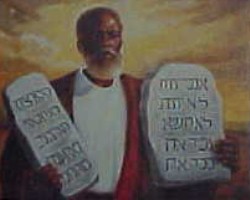 those
infamous ten big ones Moses brought down the mountain. Of course, the problem weíve
always seemed to have with the ten commandments has been the way they start with
a negative. "Thou shalt not..." Human nature is such that we react
against statements like that. Tell a kid he canít have something and what do
you suppose is the very thing he wants above all else? Place a boundary not to
be crossed in front of a teenager and see what happens. I know, cause like a
fool Iíve done it. I donít mean "fool" for having rules in the
first place. I mean "fool" for expecting a teen to rationally
understand the wisdom of it all.
those
infamous ten big ones Moses brought down the mountain. Of course, the problem weíve
always seemed to have with the ten commandments has been the way they start with
a negative. "Thou shalt not..." Human nature is such that we react
against statements like that. Tell a kid he canít have something and what do
you suppose is the very thing he wants above all else? Place a boundary not to
be crossed in front of a teenager and see what happens. I know, cause like a
fool Iíve done it. I donít mean "fool" for having rules in the
first place. I mean "fool" for expecting a teen to rationally
understand the wisdom of it all.
Yes, these first three commandments of God begin with a "no," a boundary not to be crossed, a line in the sand, a negative. Itís sort of like how the good news also begins with a negative. What else would you call the cross? For the early church this symbol of torture and death was such a negative that it didnít have the prominent place it has today. Believers didnít at first gather around crosses, placing them at the center of worship. As a symbol, the fish was more important to those initial followers of Jesus. Over time the cross entered in to the life of the church. Even so, it still lifts up the negative. Jesus died a horrible death. Of course, thatís also a positive - but in the same way as Godís "thou shalt not"s are really a positive, as well.
How can
this list which says, over and over again - "no," "no,"
"no," (etc.) actually be positive, you ask? Well, it has something to
do with that blank page with "Only me" at the top. All too easily we
fool ourselves into thinking that life is about 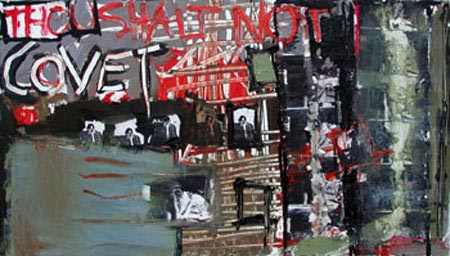 "only
me." Itís natural at certain points in our development to see ourselves
at the center of the universe. Itís even appropriate when we are a certain age
to want to be given a chance to take this "me" and try to be all the
"I" can be. Itís fitting to be given a chance to depend upon
"only me," to give it "my" best shot. The truth is, however,
that eventually the well runs dry. We reach a limit we just canít move past.
Eventually "only me" shifts from a positive ("Yeah me!") to
a negative ("is this all there is?").
"only
me." Itís natural at certain points in our development to see ourselves
at the center of the universe. Itís even appropriate when we are a certain age
to want to be given a chance to take this "me" and try to be all the
"I" can be. Itís fitting to be given a chance to depend upon
"only me," to give it "my" best shot. The truth is, however,
that eventually the well runs dry. We reach a limit we just canít move past.
Eventually "only me" shifts from a positive ("Yeah me!") to
a negative ("is this all there is?").
By the same token, "thou shalt not" in the commandments of God, these negative statements against which we so naturally rebel, are really intended by God as a positive, to ground our lives in something more than "only me." I like how Eugene Peterson paraphrases the very first commandment. "No other gods, only me." Now you knew where I got the title of this message. The unspoken positive behind that is what? All these other gods run dry. They all lead to a blank page. Thatís especially true when you think about the false god of our present age - the god of "self." Yes, the human personality is a marvelous thing. In and of itself, though, itís not enough. Once it detaches from its source, from the One who created it in the first place, it eventually runs out. The light of this god cannot burn forever. All too quickly, it burns itself out.
"No other gods, only me." Thatís the first negative which is really a positive. While it is part of our human nature to rebel, itís also part of it to yearn for the true God, for the inexhaustible well which never runs dry. This boundary, this commandment is there to keep us focused. "Only me," says the Lord. Donít look elsewhere for what only I can satisfy. Look to me and me alone. Everything else is an illusion, a mirage. Of course, it is possible to chase after mirages, but all you get in the end is sand. And is that what you really want?
"No
other gods, only me." The next three commandments serve to sharpen the
focus of this one. "Donít create your 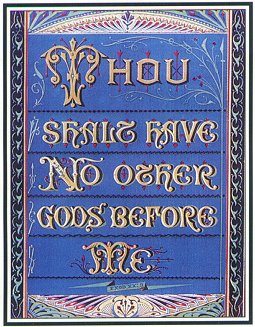 own
god." Did you know that more conservative types, like certain brands of
Amish, donít want their pictures to be taken? I believe the same could be said
of some Muslim groups, though Iím no expert in this. Why not a photograph?
Because itís a "graven image," which God forbids. "Oh, thatís
just plain silliness," we might respond. But is it really? Perhaps these
folks are aware of something that we just donít want to see.
own
god." Did you know that more conservative types, like certain brands of
Amish, donít want their pictures to be taken? I believe the same could be said
of some Muslim groups, though Iím no expert in this. Why not a photograph?
Because itís a "graven image," which God forbids. "Oh, thatís
just plain silliness," we might respond. But is it really? Perhaps these
folks are aware of something that we just donít want to see.
Long ago someone came to Jesus asking, "Master..." Hold on, I heard a good one this week. Gayle Lane said that lately little Ethan has taken to calling me "Master Pete" instead of "Pastor Pete." Gee, I wonder if thatíll catch on... Anyway, in a somewhat (and I use the word "somewhat" VERY loosely) related Bible story, someone asked Jesus - actually they referred to him as "teacher" at this point (so much for trying to bring in a little humor). Ah-hem. They asked, "Is it lawful for us to pay taxes to the emperor, or not?" (Matthew 22:17, Mark 12:14, Luke 20:22).
Do you remember how Jesus answered? He grabbed a coin and pointed to the picture carved on it? "Whose picture is this," he asked back. Duh, Caesarís. The Emperor was the current man-made "god" of that age - literally. The empire back then made no bones about it. Putting Caesarís "graven image" on the coin was a way of emphasizing his divinity. He had power, and the economy of the empire depended upon that power. Those who used this question about taxes to trap Jesus were themselves trapped, because they knew that depending upon this coin was, technically, breaking the second commandment. This "graven image" had power.
Now, Jesus
didnít say "throw those things away." Would you throw money away?
Well, actually we throw a lot of money away all the time on dumb stuff, but Iím
thinking about literally tossing it in the trash. Would you? Probably not. Jesus
didnít say, "toss it." He said what? "Render unto Caesar what
is Caesarís, and unto the Lord what is the Lordís." Almost sounds like
worship talk. "Render unto the Lord..." Does it make you think of the
second commandment? Technically, we break it all the time. Our coins may say
"In God We Trust," but right now our financial markets are listening much more
to the gods of war. Am I wrong"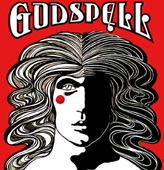
Moving on to the third commandment, let me warn you, your pastor will come close to breaking it in our upcoming production of Godspell. A ridiculous sounding statement will be made at one point in the first act, to which my character will respond, "Jeeeeesus Chr..." Of course, I'll never get to finish it for Judyís character will quickly slap her hand over my mouth. (I wonder if Judy has ever wanted to do that during a sermon?)
"Donít take the Lordís name in vain." Am I the only one who must confess breaking this one? And Iím not talking about in the middle of some musical. In moments of anger itís sometime hard to avoid, isnít it? There are folks you and I know who donít even think twice about doing it just in casual conversation. The Lordís name used irreverently sometimes becomes a spoken phrase which gives a moment for the mind to catch up, like the word "um."
I believe, however, that this commandment has more to do with using Godís name as a magic power. When we curse someone with Godís name, we are - in effect - calling down the wrath of the almighty. It becomes a tool in our arsenal. God turns into a bullet we place in our figurative revolver. And you know who is in control of the trigger? Itís not the Lord, is it?
Actually
these beginning commandments are about control and power. Is the Lord God our
God? Or are
we worshiping some other god, perhaps even the god known as "only me?"
The clear message of scripture is Godís voice saying, "Only me." If 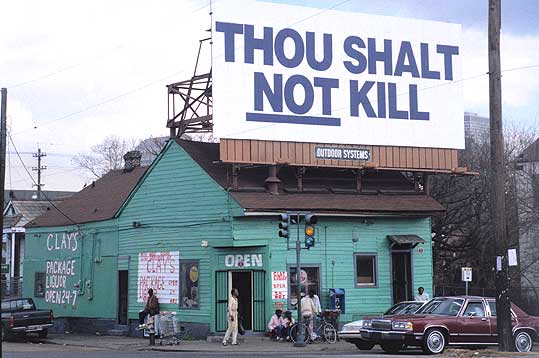 you
havenít got that straight, everything crumbles, the well runs dry, there is
nothing. The other commandments - honor your parents, no killing, no adultery,
no stealing, no lies, no lusting - they all depend upon getting the "Only
me" issue straight. If it was merely a matter of depending upon "only
me" (that is - yours truly, "I" in and of my own willful power)
to live out the "thou shalt not"s of this covenant relationship with
God, sooner or later all Iíd have would be a blank page. "PETE, WHATíS
THE POINT?" Indeed, what is the point? Why not kill? Why not steal? Why?
you
havenít got that straight, everything crumbles, the well runs dry, there is
nothing. The other commandments - honor your parents, no killing, no adultery,
no stealing, no lies, no lusting - they all depend upon getting the "Only
me" issue straight. If it was merely a matter of depending upon "only
me" (that is - yours truly, "I" in and of my own willful power)
to live out the "thou shalt not"s of this covenant relationship with
God, sooner or later all Iíd have would be a blank page. "PETE, WHATíS
THE POINT?" Indeed, what is the point? Why not kill? Why not steal? Why?
"Remember the Sabbath..." The fourth commandment sets aside time to regularly focus, to "get" the point, to remember whatís most important, to de-throne the other gods in whom we almost unthinkingly place our trust every week. Letís be honest with ourselves, we all do it. Sabbath is Godís time to re-center our lives in line with the true "Only me," the One who said "I am who I am" (Exodus 3:13-14) ... "No other gods, only me."
This time leading up to Easter is - one could say - an extended Sabbath. We need this "Sabbath" season of Lent to get things straight. For you see, if our lives are crowded with so many other gods demanding our allegiance; if weíre staring at a blank page governed by "only me," (where "I" am the "master" - thank you, Ethan - of my own destiny) and not looking up and beyond, then are we going to see a risen Lord? ... "No other gods," says the Lord God, "only me."
| online resources for this scripture text |
For commentaries consulted, see Exodus. |
©2003 Peter L. Haynes